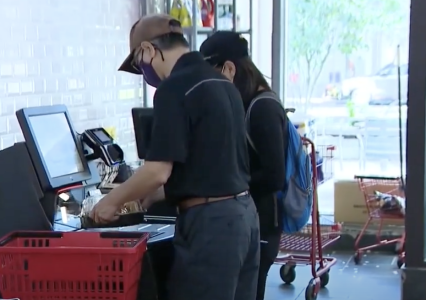Self-checkout shakeup—Here’s what’s changing!
- Replies 0
Attention, savvy shoppers and self-checkout aficionados!
A new wave of change is sweeping through the aisles of Walmart, and it's set to transform the way we ring up our groceries.
Gone are the days of breezing through self-checkout without a second thought. A hefty new fine has been introduced that makes things a bit more challenging for establishments, to say the least.
The Self-Checkout Shift: A $2,500 Wake-Up Call
In the bustling city of Long Beach, California, a groundbreaking ordinance has been passed that's turning heads and opening wallets—wide.
Retailers, including the retail giant Walmart, are now facing a strict new rule that slaps a $2,500 fine on any store that doesn't comply with the latest self-checkout regulations.
Here's the lowdown: stores can no longer leave self-checkout kiosks unattended en masse. Each employee is limited to overseeing just two machines at a time.
Plus, there must always be at least one staffed register open for customers. It's a bold move designed to clamp down on self-checkout theft, which has been on the rise.

Why the Sudden Change?
The Long Beach City Council, spearheaded by Council members Tunua Thrash-Ntuk, Mary Zendejas, and Roberto Uranga, is on a mission to tackle theft and enhance in-store security.
With petty theft in Long Beach spiking by 16% between 2023 and 2024, it's clear something had to be done.
The new ordinance isn't just about deterring shoplifters; it's also about creating a safer, more secure shopping environment for everyone.
Retail unions are cheering from the sidelines, seeing this as a victory for job creation and improved working conditions.
Also read: Attention Walmart shoppers: Here's what's you might see in stores following a possible major change!
“More people on the job means less theft and safer stores,” says Linda Molina, a local union representative.
The Cost of Convenience
Walmart, known for its embrace of automation and self-service technology, may need to rethink its staffing strategy.
The company has poured millions into self-checkout systems to keep lines moving and address labor shortages. But with the new law in place, the balance between tech and human oversight is being called into question.
Business groups, however, are sounding the alarm. They argue that the rule will inflate costs for stores, which will inevitably trickle down to consumers.
Also read: Get ready to be surprised—these everyday stores are quietly going all-in on self-checkouts
The California Retailers Association and Long Beach Chamber of Commerce are among the vocal opponents, warning that small businesses could be hit hardest.
Celeste Wilson from the Chamber of Commerce points out that while the law aims to reduce theft, it may miss the mark and simply increase expenses without addressing the underlying issues.
Source: FOX 26 Houston / Youtube.
The Future of Self-Checkout
As enforcement of the new rule kicks off, retailers are on high alert. Ignoring the staffing cap could lead to fines stacking up to astronomical amounts in a single day.
And if other cities take a page from Long Beach's book, you could be witnessing a nationwide shift in self-checkout practices.
Read next: Walmart's new anti-theft measure at self-checkout: A step forward or a misstep?

Have you experienced any changes at your local Walmart's self-checkout? What are your thoughts on balancing technology with human oversight in retail? Share your insights and experiences in the comments below!
A new wave of change is sweeping through the aisles of Walmart, and it's set to transform the way we ring up our groceries.
Gone are the days of breezing through self-checkout without a second thought. A hefty new fine has been introduced that makes things a bit more challenging for establishments, to say the least.
The Self-Checkout Shift: A $2,500 Wake-Up Call
In the bustling city of Long Beach, California, a groundbreaking ordinance has been passed that's turning heads and opening wallets—wide.
Retailers, including the retail giant Walmart, are now facing a strict new rule that slaps a $2,500 fine on any store that doesn't comply with the latest self-checkout regulations.
Here's the lowdown: stores can no longer leave self-checkout kiosks unattended en masse. Each employee is limited to overseeing just two machines at a time.
Plus, there must always be at least one staffed register open for customers. It's a bold move designed to clamp down on self-checkout theft, which has been on the rise.

A new law in Long Beach, California, imposes a $2,500 fine per violation for retailers that have one employee overseeing more than two self-checkout machines. Image source: FOX 5 New York / Youtube.
Why the Sudden Change?
The Long Beach City Council, spearheaded by Council members Tunua Thrash-Ntuk, Mary Zendejas, and Roberto Uranga, is on a mission to tackle theft and enhance in-store security.
With petty theft in Long Beach spiking by 16% between 2023 and 2024, it's clear something had to be done.
The new ordinance isn't just about deterring shoplifters; it's also about creating a safer, more secure shopping environment for everyone.
Retail unions are cheering from the sidelines, seeing this as a victory for job creation and improved working conditions.
Also read: Attention Walmart shoppers: Here's what's you might see in stores following a possible major change!
“More people on the job means less theft and safer stores,” says Linda Molina, a local union representative.
The Cost of Convenience
Walmart, known for its embrace of automation and self-service technology, may need to rethink its staffing strategy.
The company has poured millions into self-checkout systems to keep lines moving and address labor shortages. But with the new law in place, the balance between tech and human oversight is being called into question.
Business groups, however, are sounding the alarm. They argue that the rule will inflate costs for stores, which will inevitably trickle down to consumers.
Also read: Get ready to be surprised—these everyday stores are quietly going all-in on self-checkouts
The California Retailers Association and Long Beach Chamber of Commerce are among the vocal opponents, warning that small businesses could be hit hardest.
Celeste Wilson from the Chamber of Commerce points out that while the law aims to reduce theft, it may miss the mark and simply increase expenses without addressing the underlying issues.
Source: FOX 26 Houston / Youtube.
The Future of Self-Checkout
As enforcement of the new rule kicks off, retailers are on high alert. Ignoring the staffing cap could lead to fines stacking up to astronomical amounts in a single day.
And if other cities take a page from Long Beach's book, you could be witnessing a nationwide shift in self-checkout practices.
Read next: Walmart's new anti-theft measure at self-checkout: A step forward or a misstep?
Key Takeaways
- A new law in Long Beach, California, imposes a $2,500 fine per violation for retailers that have one employee overseeing more than two self-checkout machines.
- Long Beach City Council introduced the rule to combat rising theft and improve in-store safety after a 16% increase in petty crime.
- The law also dictates that stores must maintain at least one staffed register open at all times to provide better security and potentially create more jobs.
- Business groups, including the California Retailers Association and Long Beach Chamber of Commerce, oppose the regulation, arguing it will increase costs for stores and customers. Retailers like Walmart have invested in technology to reduce theft and are awaiting the impact of new staffing mandates on operations.
Have you experienced any changes at your local Walmart's self-checkout? What are your thoughts on balancing technology with human oversight in retail? Share your insights and experiences in the comments below!






